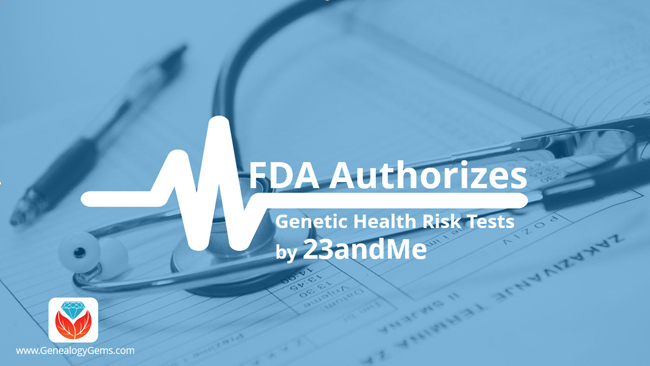FDA Authorizes Genetic Health Risk Tests by 23andMe
If you have ever wondered if you or your loved ones are at higher risk for diseases such as Late-onset Alzheimer’s disease, read on to learn about big changes that are happening. Health history is just one of the ways in which genealogy research can benefit your family.

According to a recent FDA press release, “The U.S. Food and Drug Administration today allowed marketing of 23andMe Personal Genome Service Genetic Health Risk (GHR) tests for 10 diseases or conditions. These are the first direct-to-consumer (DTC) tests authorized by the FDA that provide information on an individual’s genetic predisposition to certain medical diseases or conditions, which may help to make decisions about lifestyle choices or to inform discussions with a health care professional.”
The release goes on to say:
Consumers can now have direct access to certain genetic risk information,” said Jeffrey Shuren, M.D., director of the FDA’s Center for Devices and Radiological Health. “But it is important that people understand that genetic risk is just one piece of the bigger puzzle, it does not mean they will or won’t ultimately develop a disease.”
The GHR tests are intended to provide genetic risk information to consumers, but the tests cannot determine a person’s overall risk of developing a disease or condition. In addition to the presence of certain genetic variants, there are many factors that contribute to the development of a health condition, including environmental and lifestyle factors.
The 23andMe GHR tests work by isolating DNA from a saliva sample, which is then tested for more than 500,000 genetic variants. The presence or absence of some of these variants is associated with an increased risk for developing any one of the following 10 diseases or conditions:
- Parkinson’s disease, a nervous system disorder impacting movement
- Late-onset Alzheimer’s disease, a progressive brain disorder that destroys memory and thinking skills
- Celiac disease, a disorder resulting in the inability to digest gluten
- Alpha-1 antitrypsin deficiency, a disorder that raises the risk of lung and liver disease
- Early-onset primary dystonia, a movement disorder involving involuntary muscle contractions and other uncontrolled movements
- Factor XI deficiency, a blood clotting disorder
- Gaucher disease type 1, an organ and tissue disorder
- Glucose-6-Phosphate Dehydrogenase deficiency, also known as G6PD, a red blood cell condition
- Hereditary hemochromatosis, an iron overload disorder
- Hereditary thrombophilia, a blood clot disorder
You can read the complete article called FDA allows marketing of first direct-to-consumer tests that provide genetic risk information for certain conditions here.
 FDA and 23andMe – Comments from Your DNA Guide
FDA and 23andMe – Comments from Your DNA Guide
I look to Your DNA Guide, Diahan Southard for all things genetic genealogy, and here’s what she had to say about the recent news:
23andMe is certainly the outlier among our genetic genealogy companies. It is different because its purpose is not necessarily to help you find your ancestors or determine your ethnic composition, though it can do both, but their goal is to empower your personal health.
In November of 2013 the FDA ordered 23andMe to retract all health reporting from their website in order to better regulate the dissemination of health related information to consumers. 23andMe has slowly crawled back toward that same reporting structure, all the while jumping through the compliant hoops that the FDA has set up.
Now this week they have had a major step forward as they have been able to release the risk assessment for 10 major diseases including Parkinson’s and celiac. This is the first such test available direct to consumers, without first going to your doctor.
This is likely the first of many such developments as 23andMe works to make our own health more accessible via our genetics. If you do pursue this kind of evaluation, it is important to keep in mind the words of Jeffrey Shuren, M.D., director of the FDA’s Center for Devices and Radiological Health, “…genetic risk is just one piece of the bigger puzzle, it does not mean they will or won’t ultimately develop a disease.”
Learn More About 23andMe
As with all genetic testing, it’s your decision in the end, so be as informed as you can. Diahan’s quick reference guide Understanding 23andMe (a Companion Guide to Autosomal DNA for the Genealogist) will help you tap into the company’s services from a genealogical perspective. Over 1 million people have had their DNA evaluated by 23andMe. This website has powerful family history tools and this guide will answer the most pressing questions like:
- How can I control how much information is being shared with others?
- How can I enter my genealogical information?
- How do I know when I have a good match?
- Is the YDNA and mtDNA information they give the same as what I see at other places?
- What is the best way to use the ethnicity results presented?






